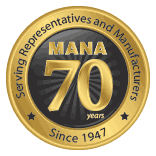 In this issue, we continue our celebration of MANA’s 70th anniversary year with another “Blast From the Past” from MANA’s early years.
In this issue, we continue our celebration of MANA’s 70th anniversary year with another “Blast From the Past” from MANA’s early years.
From the first issue of The Agent and Representative magazine in July 1949 (which eventually became Agency Sales magazine) we share the story of Bill Herendon.
It’s a story that could just as easily have been written last month as 68 years ago, except that now many manufacturers have joined MANA, have stronger relationships with their representatives, and would not be so easily misled by the ploy that ended Herendon’s relationship with his principal.
And now, read the article from the very first magazine ever published by MANA.
The Story of BILL HERENDON
By Paul Edouard
(Reprinted from July 1949 The AGENT and Representative magazine)
Editor’s Note: The author was a young 3-minute speaker in World War II, and is now a 3-minute business-story writer, each story with a moral. Names and places mentioned are fictional, and any similarity to persons living or dead is purely accidental.
His name was Herendon — Bill Herendon. If you’ll look in the phone book, you’ll not likely find a Herendon there, although there probably is a Bill Herendon in every large city in the United States. Only, in the phone books, they go by their right names.
Sitting next to me there in the grill, I could see that Bill was a square-shouldered, square-jawed individual, with plenty of turkey-foot lines fanning back from a pair of friendly, if now sad, blue eyes. I signaled the waiter, this time including Bill. Over his objections, I asked his profession.
Bill was a manufacturers’ agent, or had been for many years. As a hobby, he learned to fly, and in good weather covered his territory that way. When he washed out “Jenny” in an Arizona flash storm, he joined the Air Reserve for “free time” to hold his license. Then, one day — BANG! — and he was in the Navy.
That little tour of duty is another story — and I’ll bet interesting! I’m hoping Bill will tell me something about it some time.
VE and VJ days arriving, Bill finally came back home; hung out the old shingle again. But it was a bit tough. He had had to release the old accounts, of course, and getting them back was something else again — what with liquidation and retirement, war conversion to unsuited items, and just plain scarcity of raw and finished materials.
But by playing hop-scotch, so to speak, Bill kept going for a year; and then, as goods started rolling along, began rebuilding his business and his accounts in dead earnest.
“Worked mighty hard,” he told me, over his old-fashioned, “building up strong jobber connections for two Eastern lines. Sometimes, to get a jobber I wanted the factory to have,” he said, “I went pretty far in giving exclusives.”
Oh yes, Bill knew all about “eggs all in one basket,” but trusted, and took the chance. Didn’t even have formal contracts with his two principals. “Never had a written contract in my life,” he said. “No one ever mistrusted Bill Herendon.”
At the end of the second year, Bill was going great guns, back in the old stride — new office, smart secretary, salesmen in training — doing a bang-up job for all concerned.
“Then, one day,” and he looked at me with bewilderment still in his eyes, “things began to happen to me.”
At the new municipal airport, the manager of Bill’s biggest and best account weighed in his bags for the East. “Yes, on time,” said the attendant, and passed him through.
In a matter of hours the DC-6 set him down in the northern end of the Buckeye State. The next morning he was at the desk of the president of one of Ohio’s up and coming manufacturing concerns.
“Glad to meet the manager of one of our best jobbing accounts,” smiled the president. “How’s Bill Herendon? ”
“Herendon? … Oh, all right, I guess … last time I saw him,” parried the jobber.
“Last time you saw him? … I don’t understand,” said the president.
“Well, frankly, that’s why I’m here,” answered the jobber, as though it hurt him to say it more than it was going to hurt Bill. “It just doesn’t seem fair that we invest the money — you and I — promote and sell the goods, and Herendon pirates a nice fat commission out of your hard-earned profits — and mine!”
There ensued a half hour of spirited conversation, the president trying to build Bill up and the jobber slowly tearing him down.
“Anyway,” said the president, rising, “there’s nothing I can do about it. We have a contract with Herendon, and we live up to our contracts.”
The phone rang. “Yes, Miss Jones, I’m taking that plane. Wire Boston. And, Miss Jones, send in my sales manager, please.”
The president offered apologies, introduced his new sales manager, and was gone.
With a clear field, the jobber started working on the new sales manager — but systematically! By the second day, it was established beyond doubt that there was no contract in existence with Bill Herendon. Merely a brief exchange of letters, mentioning the commission rate orally agreed upon for business in the new territory, obtained by Bill and approved by the company. Nothing more binding; nothing legal at all.
All the jobber wanted was an “advertising allowance,” less than Herendon’s commission. “And that advertising, placed by us right at the spot, will be worth far more than anything Herendon could possibly do, even if he worked conscientiously at his job, which he certainly isn’t,” concluded the jobber’s manager.
The new sales manager was impressed — impressed with the possibilities in the suggestion, and with his own newly acquired authority. After all, hadn’t the president said he was to be the undisputed boss of sales? Why have to compete with Herendon?
So, the deal was concluded, the jobber leaving a big, fat order for goods hard to get anywhere, at any price; and, satisfied, flew back from whence he came.
In Boston, the president wasn’t feeling so well; decided to run on up to Maine for a much needed rest; wired his sales manager, “Place you in complete charge. Will be away at least a month.”
That did it!
One by one the sales manager took over Bill’s jobbers, flying them in to Cleveland and passing out the advertising allowances. “For the present, just say nothing to Herendon. You understand? That’s all I ask,” cautioned the sales manager. “In due course, I’ll be out to see you, and we’ll play some more golf, and have fun!”
Each jobber inwardly smiled over the cash gain through the old advertising dodge, secretly felt sorry for good old Bill — but then … well, that was Bill’s problem.
It was two months before Bill actually learned the truth of the matter, and even then he wouldn’t believe it. He had known that business was off a bit, but still not that badly off.
The look in the eyes of his friendliest jobbers, those who really did appreciate a job well done by a factory representative — whether on salary or commission — made Bill call Cleveland the moment he could get back to his office.
“Then I consulted a lawyer,” Bill told me, sadly.
“What, no contract, Mr. Herendon? … I’m afraid you haven’t a leg to stand on,” said the attorney, with complete finality.
And that about sums up the story of Bill Herendon, at least for the present. The pins had really been knocked out from under him. The war had made him a bit reckless perhaps, measured by commercial standards. The unquestioned loyalty of his flying pals was a thing taken for granted. This peace-time stuff he couldn’t quite bring himself to understand again.
“Why should anyone want to do a thing like that to me?” Bill asked.
“What are you doing now. Bill?” I ventured, as Bill signaled the waiter.
“Well, not much of anything,” he replied. “I go to the hospital once a week; nerves they say, but I’m getting better.” Without Bill noticing, I picked up the tab … and said good night. At the desk, the club’s cashier told me that Bill came there about once a week. Seemed lonely, and melancholy.
Thoughtfully, I said, “Too bad,” and slowly went my way.
MORAL (by John Dryden): “Bold knaves thrive, without one grain of sense; but good men starve for want of impudence.”



